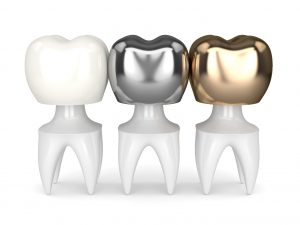
Dental crowns serve a number of important purposes. They can renew the form and function of damaged teeth, and they can even help to replace missing teeth. However, all crowns are not created equal. Many factors, including the skill of the one designing the crown, as well as what the crown is made of, affect its performance. In this blog post, a dentist in Allen discusses the latter of those two factors. We’ll compare various crown materials so you can make the choice that is best for your unique situation.
Gold and Other Metals
For many years, an alloy made of gold and other metals was the go-to material for crowns. Today, gold is still an excellent option for many patients. It is extremely durable, and the vast majority of people have no allergic reactions to gold. Also, gold crowns are very thin, which means that minimal tooth preparation is required.
Silver crowns (which are usually a mixture of at least two metals) are also quite durable and thin. They are usually used for molars because they are able to withstand a great deal of chewing force.
Porcelain
In recent times, porcelain has become the preferred crown material for patients who are concerned about aesthetics. Porcelain can be shade-matched to blend in flawlessly with the surrounding teeth, meaning that the crowns are virtually unnoticeable. They are also stain-resistant, so they maintain their original beauty for many years.
Porcelain by itself is quite durable, but some dentists recommend a porcelain-fused-to-metal (PFM) crown as the best way to enjoy both durability and beauty. The biggest disadvantage of PFM crowns is that in some cases, the metal base is visible.
Zirconia
Zirconia is a ceramic-like material that is extremely durable — in fact, it is even tougher than porcelain. It is so strong that it is sometimes used for dental implants, which must be able to withstand decades of continual chewing force. Just like porcelain, though, zirconia offers remarkable aesthetics; onlookers may have no idea that you have a zirconia crown.
Which Is Best?
There is no “best” material for dental crowns, but one may be best for you. For example, a metal crown may be most reasonable if one of your back teeth needs to be restored, whereas porcelain might be the ideal choice if one of your front teeth requires a crown. When your prosthodontist or dentist in Allen is deciding which material to recommend, they will also consider your budget, whether you have any metal sensitivities, and the state of the tooth being treated.
Does it matter what your dental crown is made of? Yes! Each material offers unique advantages. Your dentist can help you choose the one that is right for you.
About the Author
Dr. Keyvan Kar is a dentist and prosthodontist who provides a range of restorative treatments, including dental crowns. His knowledge of dental prosthetics ensures that each crown he designs provides the best possible function and aesthetics. To learn more about dental crowns or Dr. Kar’s other services, contact our office today at 214-260-9911.
